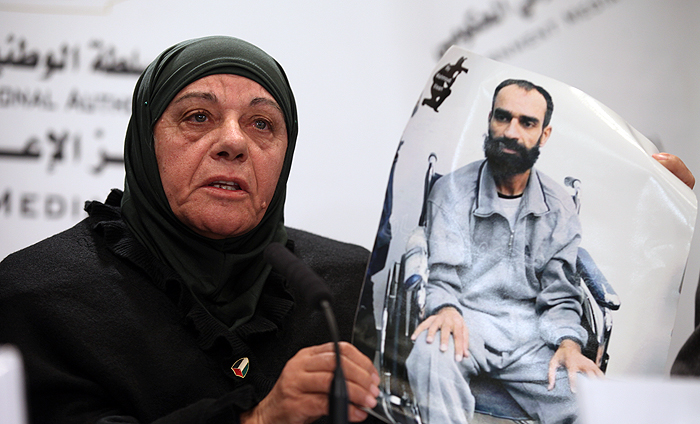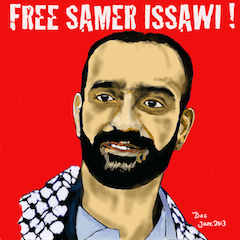Roger Waters: my journey to BDS
 In 1980, a song I wrote, “Another Brick in the Wall Part 2,” was banned by the governmen t o f South Africa because it was being used by Black South African children to advocate their right to equal education. That apartheid government imposed a cultural blockade, so-to-speak, on certain songs, including mine.
In 1980, a song I wrote, “Another Brick in the Wall Part 2,” was banned by the governmen t o f South Africa because it was being used by Black South African children to advocate their right to equal education. That apartheid government imposed a cultural blockade, so-to-speak, on certain songs, including mine.
Twenty-five years later, in 2005, Palestinian children participating in a West Bank festival used the song to protest Israel’s apartheid wall. They sang “We don’t need no occupation! We don’t need no racist wall!” At the time, I hadn’t seen first-hand what they were singing about.
A year later in 2006, I contracted to perform in Tel Aviv.
Palestinians from the movement advocating an academic and cultural boycott of Israel urged me to reconsider. I had already spoken out against the wall, but I was unsure whether a cultural boycott was the right way to go. The Palestinian advocates of a boycott asked that I visit the occupied Palestinian territory, to see the Wall for myself before I made up my mind. I agreed.
Under the protection of the UN I visited Jerusalem and Bethlehem. Nothing could have prepared me for what I saw that day. The Wall is an appalling edifice to behold. It is policed by young Israeli Soldiers who treated me, a casual observer from another world with disdainful aggression. If it could be like that for me, a foreigner, a visitor, imagine what it must be like for the Palestinians, for the underclass, for the passbook carriers. I knew then that my conscience would not allow me to walk away from that Wall, from the fate of the Palestinians I met, people whose lives are crushed daily in a multitude of ways by Israel’s occupation. In solidarity, and somewhat impotently, I wrote on their wall that day: “We don’t need no thought control.”
Realizing at that point that my presence on a Tel Aviv stage would inadvertently legitimize the oppression I was witnessing, I canceled my gig at the football stadium in Tel Aviv and moved it to Neve Shalom an agricultural community devoted to growing chick peas and also, admirably, to cooperation between people of different faiths, where Muslim, Christian and Jew live and work side by side in harmony.
Against all expectations, it was to become the biggest music event in the short history of Israel. 60,000 fans battled traffic jams to attend. It was extraordinarily moving for me and my band, and at the end of the gig I was moved to exhort the young people gathered there to demand of their government that they attempt to make peace with their neighbors and respect the civil rights of Palestinians living in Israel.
Sadly in the intervening years, the Israeli government has made no attempt to implement legislation that would grant civil rights to Israeli Arabs equal to those enjoyed by Israeli Jews, and The Wall has grown, inexorably, illegally annexing more and more of The West Bank.
I had learned that day in Bethlehem in 2006 something of what it means to live under occupation, imprisoned behind a Wall. It means that a Palestinian farmer must watch olive groves centuries old, uprooted. It means that a Palestinian student cannot get to school because the checkpoint is closed. It means a woman may give birth in a car, because the soldier won’t let her pass to the hospital that’s a ten minute drive away. It means a Palestinian artist cannot travel abroad to exhibit work, or to show a film in an international film festival.
For the people of Gaza, locked in a virtual prison behind the wall of Israel’s illegal blockade, it means another set of injustices. It means that children go to sleep hungry, many chronically malnourished. It means that fathers and mothers, unable to work in a decimated economy, have no means to support their families. It means that university students with scholarships to study abroad must watch the opportunity of a lifetime slip away because they are not allowed travel.
In my view, the abhorrent and draconian control that Israel wields over the besieged Palestinians in Gaza, and the Palestinians in the occupied West Bank (including East Jerusalem), coupled with its denial of the rights of refugees to return to their homes in Israel, demands that fair minded people around the world support the Palestinians in their civil, nonviolent resistance.
Where governments refuse to act, people must, with whatever peaceful means are at their disposal. For some that meant joining the Gaza Freedom March, for others it meant joining the humanitarian flotilla that tried to bring much needed humanitarian aid to Gaza.
For me it means declaring my intention to stand in solidarity, not only with the people of Palestine, but also with the many thousands of Israelis who disagree with their governments racist and colonial policies, by joining a campaign of Boycott, Divestment, and Sanctions (BDS) against Israel, until it satisfies three basic human rights demanded in international law.
1. Ending its occupation and colonization of all Arab lands [occupied since 1967] and dismantling the Wall;
2. Recognizing the fundamental rights of the Arab-Palestinian citizens of Israel to full equality; and
3. Respecting, protecting and promoting the rights of Palestinian refugees to return to their homes and properties as stipulated in UN resolution 194.
My conviction is born in the idea that all people deserve basic human rights. My position is not anti Semitic. This is not an attack on the people of Israel. This is, however, a plea to my colleagues in the music industry, and also to artists in other disciplines, to join this cultural boycott.
Artists were right to refuse to play in South Africa’s Sun City resort until apartheid fell and whites and blacks enjoyed equal rights. And we are right to refuse to play in Israel until the day comes — and it surely will come — when The Wall of occupation falls and Palestinians live alongside Israelis in the peace, freedom, justice and dignity that they all deserve.
Roger Waters 25th February 2011




Recent Comments